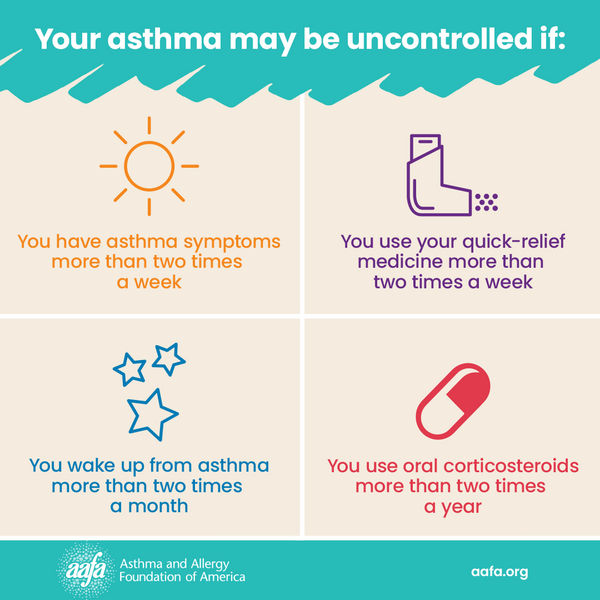One of your goals when you have asthma is to keep it under control. The best way to manage your asthma is by:
- Managing your exposure to your asthma triggers
- Taking your asthma medicines as prescribed by your doctor
- Being prepared to treat asthma episodes if they occur
How Do I Know If My Asthma Is Under Control?
A good way to know if your asthma is not well-controlled is by answering these questions:
- Do you have asthma symptoms more than two times a week?
- Do you need your quick-relief medicine to treat symptoms more than two times a week?
- Do you wake up from asthma more than two times a month?
- Do you use oral corticosteroids (like prednisone) more than two times a year?
If the answer is “yes” to any of these questions, it is a sign that your asthma is not under control. There are many treatment options to support asthma control.

Location and Asthma Control
Uncontrolled asthma can impact your overall health and quality of life. For example, it could lead to missed days of work or school. It may also lead to asthma episodes that require a visit to the emergency department (ED).
AAFA’s annual Asthma Capitals™ report looks at asthma-related ED visits (along with other asthma data) to identify how challenging cities are to live in when you have asthma. It is important to keep your asthma controlled no matter where you live, but it helps to know what other challenges you may face if you live in an Asthma Capital. The report also outlines various location-related factors that may affect asthma control, such as exposure to poor air quality.
How Do Asthma Medicines Help Me with Asthma Control?
Asthma medicines work to help control or prevent symptoms as well as relieve symptoms when they happen.
There are three changes that happen in the airways when someone has asthma:
- Swelling inside the airways
- Excess mucus clogs the airways
- Muscles tighten and squeeze around the airways
These changes make the airways smaller or narrower, making it harder to breathe. There are asthma medicines that target these three changes. They open your airways and make it easier to breathe.
There are four types of asthma medicines and treatments:
- Quick-relief medicines – These medicines work quickly to relieve sudden symptoms. You take them as needed and at the first sign of symptoms.
- Controller medicines – These medicines help control asthma by correcting the underlying changes in the airways, such as swelling and excess mucus. They can be one or a combination of medicines.
- Combination of quick-relief and controller medicines – These medicines are used for both short-term relief and control.
- Biologics – This type of treatment targets a cell or protein to prevent swelling inside the airways. They are for people with certain types of persistent asthma and are given by injection or infusion.
These medicines work together to reduce swelling and mucus in your lungs and relax the muscles around your airways. Your doctor will give you an Asthma Action Plan that lists the medicines you take and when to take them.
How Does an Asthma Action Plan Help Me with Asthma Control?
A written Asthma Action Plan helps you identify asthma symptoms and to know which medicines to take and when to take them. The goal of asthma treatment is to maintain asthma control with the least amount of medicine needed.
An Asthma Action Plan also tells you what to do if you have an asthma emergency. Everyone with asthma should have an Asthma Action Plan.
What Should I Do If My Asthma Is Not Under Control?
If you feel your asthma is not well-controlled, talk with your doctor. They can work with you to help you better manage your asthma. Asthma control is possible with the right treatment plan.
Get answers to your asthma and allergy questions on our online forums.


Comments (1)